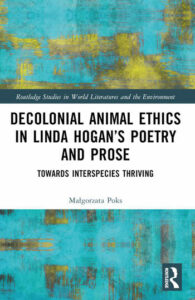Rzecz, która nie przestaje zachwycać, to skromne piękno zadrukowanej strony. Książka wydaje się najbardziej ubogą ze sztuk. Fotografia, film, malarstwo, muzyka dysponują nieskończenie bardziej sugestywnymi środkami przedstawiania świata. A literatura? Czarne znaczki na papierze. Ale kiedy wpuścić je w nasze umysły, potrafią tam dokonać cudów. Pracują w naszych głowach najskuteczniej i najciekawiej ze wszystkich znaków, jakimi opisujemy świat – przekonuje w nowym tomie esejów Ryszard Koziołek. Odkrywa w nim przed czytelnikami transformującą moc literatury, która pozwala nam budować i wzbogacać nie tylko nasz własny świat, ale też kształtować mądre, dojrzałe społeczeństwo. Ta polityczna moc literatury – budowanie wspólnoty, otwieranie przestrzeni dyskusji, łączenie doświadczeń – jest dla niego równie ważna, jak jej działanie na wyobraźnię. Na nowo więc opowiada nam o tym, na czym polega kunszt powieściowy Tokarczuk i Pilcha, dlaczego Harry Potter pozwala nam wrócić do dzieciństwa i napełnić świat zasadami moralnymi, a wreszcie jak za pomocą literatury rozmawiać o tym, co politycznie niepoprawne.
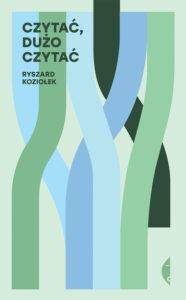
„Zum Beispiel hat es bei Südseeinsulanern intensivsten Neid gegeben, wenn sie als Bootgemeinschaft zu Tauschzwecken eine längere Reise unternahmen, wobei der eine Teilnehmer erfolgreicheren Handel tätigte. Gift und Schadenzauber waren oft sein Los. Es gibt ja, wie immer wieder betont werden muß, keine Anzeichen dafür, daß in der engeren Gemeinschaft, in der einfachsten Gesellschaft eines Naturvolks, irgendwo dieser schöne neidlose, privateigentumslose Kollektivgeist alle erfüllt habe, von dem uns abendländische Sozialutopisten immer wieder fabuliert haben.“
Helmut Schoeck, Der Neid (1966)
„Ein Problem bleibt aber und wird größer werden: in der Gesellschaft der planmäßig zum Neider erzogenen Mitmenschen, im gesellschaftspolitischen Klima der egalitären Ideologien werden die Erfolgreichen, die Könner, die zielstrebig am eigenen Berufserfolg arbeitenden Personen notwendigerweise immer mehr zu einer diskriminierten Minderheit. Sie müssen damit rechnen, daß man ihnen mit jedem Mittel ein schlechtes Gewissen aufzunötigen sucht.“
Helmut Schoeck, Das Recht auf Ungleichheit (1980)
Karsten Dahlmanns, promovierter Philosoph und habilitierter Literaturwissenschaftler, lebt und lehrt seit 2004 in Polen.
Ausgewählte Buchveröffentlichungen: Hrsg. mit Aneta Jachimowicz, Geliebtes, verfluchtes Amerika. Zu Antiamerikanismus und Amerikabegeisterung im deutschen Sprachraum 1888-1933, Göttingen 2022; Hrsg. mit Matthias Freise und Grzegorz Kowal, Krieg in der Literatur, Literatur im Krieg, Göttingen 2020; Das verfluchte Amerika. Stefan Georges Bildnis von Unternehmertum, Markt und Freiheit, Würzburg 2016; Wissenschaftslogik und Liberalismus. Mit dem Kritischen Rationalismus durch das Dickicht der Weltanschauungen, Geleitwort von Hans Poser, Berlin 2009.
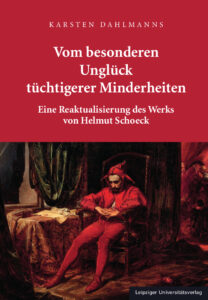
Zofia Kossaks Geschichte(n) Erfahrungen und Kontexte. Renata Dampc-Jarosz (Hg.), Andrzej Kowalczyk (Hg.), Lucyna Sadzikowska (Hg.), Marta Tomczok (Hg.), Paweł Tomczok (Hg.). Vandenhoeck & Ruprecht Verlage 2023. ISBN: 978-3-8471-1547-2, ss. 164.
Die polnische Schriftstellerin Zofia Kossak (1889–1968) schrieb historische Romane, mit denen sie versuchte, die Traumata des 20. Jahrhunderts zu überwinden – zwei Kriege, die Oktoberrevolution, die Inhaftierung im Konzentrationslager Auschwitz und den Verlust der Heimat. Die Beiträger:innen befassen sich mit individuellen und kollektiven Erfahrungen, mit der menschlichen Einsamkeit angesichts der großen Geschichte, wobei der Schwerpunkt auf den Prosawerken und autobiografischen Aufzeichnungen Kossaks liegt, die sowohl in Bezug auf die Erzählweise als auch auf den Ideengehalt als Traditionalistin gilt. Die hier vorgeschlagenen Interpretationen, die sich auf zeitgenössische literaturwissenschaftliche Theorien stützen, brechen jedoch mit dem stereotypen Denken und werfen ein neues Licht auf Kossaks Werk, indem sie die Aufmerksamkeit auf das lenken, was sie in ihrer unmittelbaren Umgebung wahrnahm, was sie beschäftigte und was auch zu den Problemen des 21. Jahrhunderts gehört: auf den Totalitarismus, den Heimatverlust, die Bedeutung der Vergangenheit für die Gegenwart oder die Sorge um die Umwelt angesichts der industriellen Entwicklung.
The Polish writer Zofia Kossak (1889–1968) wrote historical novels with which she tried to overcome the traumas of the 20th century: two wars, the October Revolution, imprisonment in KL Auschwitz and the loss of her homeland. The contributors deal with individual and collective experiences, with human loneliness in the face of the great story, focusing on the prose works and autobiographical notes of the writer who is considered a traditionalist both in terms of narrative style and idea content. However, the interpretations proposed here, based on contemporary literary theories, break with stereotypical thinking and shed new light on Zofia Kossak’s work by drawing attention to what she perceived in her immediate surroundings, what preoccupied her and what is also part of the problems of the 21st century: totalitarianism, loss of homeland, the significance of the past for the present or concern for the environment in the face of necessary industrial development.
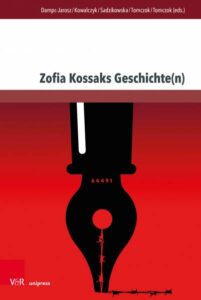
Monografia prezentuje oryginalne, hermeneutyczne podejście do interpretacji gier cyfrowych. Książka składa się ze studiów przypadku gier cyfrowych, które skupiają się na różnych aspektach ich problematyki filozoficznej: od zarządzania życiem, przez pytania dotyczące ich ontologii, po sposób, w jaki tworzą przestrzenie do życia i mitologiczne opowieści o naszej współczesności. Autor przedstawił w niej dziesięciostopniową instrukcję interpretacji gier, która ma na celu pomoc studentom i badaczom w analizie gier cyfrowych. Książka zawiera interpretacje takich nagradzanych tytułów, jak Horizon: Zero Dawn, Cyberpunk 2077, Frostpunk czy Disco Elysium.
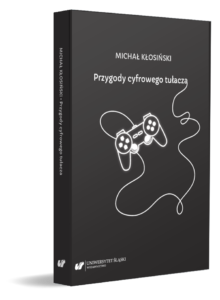
Praca wpisuje się w żywy w ostatnich latach nurt badań humanistycznych – masculinity studies. W rozdziale teoretycznym autor przybliża i mapuje najnowsze światowe badania z tego obszaru. W kolejnych rozdziałach analitycznych demonstruje możliwość wykorzystania tych metodologii w kręgu rodzimego literaturoznawstwa. Aplikowanie omówionych we wstępie nowych konceptów do analizy tekstów literackich pozwala pokazać nieświadome i często trudno wyrażalne napięcie, jakie w interpretowanych tekstach wprowadzają niestabilne limitacje kategorii genderowych – niekoniecznie związane z naszym „tu i teraz”, lecz, jak się okazuje, dość powszechne i transhistoryczne. Przykładowe analizy wydobywają z tekstów literackich napięcia na pierwszy rzut oka niewidoczne, nienazywane, ale fundamentalne, tym samym otwierając pole dalszych dociekań kolejnych badaczek i badaczy. Wszystkie omawiane fabuły pokazują, jak zmiany warunków politycznych, społecznych, kulturowych i ekonomicznych modyfikowały definiowanie tego, co jest „męskie” bądź „niemęskie”, i jak bohaterowie do tych zmian się odnosili, czasem próbując adaptacji, kiedy indziej zaś kontestacji. Między wierszami tych tekstów odnaleźć można niepewność, niepokój i pragnienie ustanowienia (wyobrażonego) ontologicznego fundamentu męskiego gender, którego jednak brak w sekularyzującej się płynnej rzeczywistości. Co więcej, każda niemal z tych zmian rezonuje w męskich ciałach.
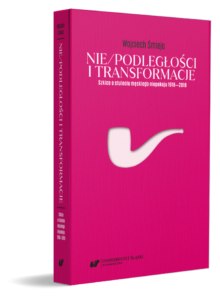
Although Michelangelo Antonioni became one of the icons of “modernist” cinema in the 1960s, his position in the pantheon of great directors has never been quite secure. Unlike his famous contemporaries, such asIngmar Bergman and Luchino Visconti, whose essential contribution to the art of cinema is hardly ever questioned, Antonioni’s work has been repeatedly denigrated from many angles for both aesthetic and political reasons. Though the historical importance of some of Antonioni’s films as an incarnation of certain attitudes and problems characteristic of the 1960s and 70s is not denied, they are often considered passé, artificial and boring.
Contesting prevalent readings, which focus on existential and psychological motifs involving anxiety and the malady of sentiments, this book offers a re-evaluation of Antonioni’s most important films interpreted as political cinema engaged with issues which are still crucial in the 21st century. Far from being politically neutral, Antonioni’s oblique and “abstract” approach makes possible the prising open and devaluation of the morally and politically constrictive “organic” narrative structures. HIs approach overthrows the primacy of character and plot, on the one hand, by showing them to be emanations of the spectral materiality of capital, and, on the other hand, by allowing for an opening into the utopian dimension, implying engagement in the rethinking of our attachments to the world.
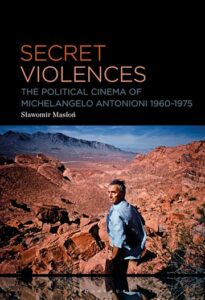
Cień dotyka mnie. Wiersze i proza. Krystiana Robb-Narbutt, oprac. Piotr Mitzner, oprac. Marta Tomczok. Wydawnictwo Uniwersytetu Śląskiego. Katowice 2023. ISBN: 978-83-226-4236-8, ss. 274.
Seria: Biblioteka Narracji o Zagładzie (2), ISSN 2720-1597
Krystiana Robb-Narbutt należy do najbardziej inspirujących i zarazem najsłabiej znanych artystek oraz poetek polsko-żydowskich XX i XXI wieku. Tworzyła grafiki, instalacje i obiekty, a także miniaturowe prozy i wiersze. Wystawiała je m.in. w Kordegardzie i Zachęcie. W marcu 1968 roku za udział w protestach i roznoszenie ulotek skazano ją na więzienie. Materią jej twórczości były biografia i wyobraźnia. Książka zawiera wszystkie odczytane z rękopisów wiersze i prozy Robb-Narbutt oraz ich krytyczne omówienie. Uzupełniają je głosy krytyków literatury, sztuki oraz przyjaciół artystki.
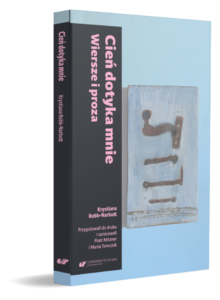
Friendship in Ancient Greek Thought and Literature. Essays in Honour of Chris Carey and Michael J. Edwards. Ed. by Athanasios Efstathiou, Jakub Filonik, Christos Kremmydas, Eleni Volonaki. Brill 2023. ISBN: 978-90-04-54633-2/ISBN: 978-90-04-54867-1 [series: Mnemosyne, Supplements, Volume: 474].
Friendship (philia) is a complex and multi-faceted concept that is frequently attested in ancient Greek literature and thought. It is also an important social phenomenon and an institution that features in classical Greek social, cultural, and intellectual history. This collected volume seeks to complement the extensive modern scholarship on this topic by shedding light on complementary representations, nuances and tensions of friendship in a range of different sources, literary, epigraphic, and visual. It offers a broad overview of the contours of this important social phenomenon and helps the reader get a glimpse of its depth and richness.
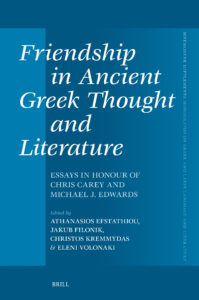
Citizenship in Antiquity brings together scholars working on the multifaceted and changing dimensions of citizenship in the ancient Mediterranean, from the second millennium BCE to the first millennium CE, adopting a multidisciplinary and comparative perspective.
The chapters in this volume cover numerous periods and regions – from the Ancient Near East, through the Greek and Hellenistic worlds and pre-Roman North Africa, to the Roman Empire and its continuations, and with excursuses to modernity. The contributors to this book adopt various contemporary theories, demonstrating the manifold meanings and ways of defining the concept and practices of citizenship and belonging in ancient societies and, in turn, of non-citizenship and non-belonging. Whether citizenship was defined by territorial belonging or blood descent, by privileged or exclusive access to resources or participation in communal decision-making, or by a sense of group belonging, such identifications were also open to discursive redefinitions and manipulation. Citizenship and belonging, as well as non-citizenship and non-belonging, had many shades and degrees; citizenship could be bought or faked, or even removed. By casting light on different areas of the Mediterranean over the course of antiquity, the volume seeks to explore this multi-layered notion of citizenship and contribute to an ongoing and relevant discourse.
Citizenship in Antiquity offers a wide-ranging, comprehensive collection suitable for students and scholars of citizenship, politics, and society in the ancient Mediterranean world, as well as those working on citizenship throughout history interested in taking a comparative approach.
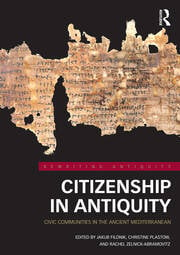
Tematem książki są początki polskiej awangardy literackiej, a wraz z nimi tkwiąca w otwarciu awangardowej rewolty energia pierwszych gestów uznawanych za gesty futurystyczne. Autorka podejmuje próbę ich reinterpretacji przez pryzmat trzech głównych bohaterów monografii: Jerzego Jankowskiego, wiecznego zwiastuna futuryzmu i zanikającego pośrednika jego późniejszych losów, oraz Anatola Sterna i Aleksandra Wata, występujących tu przede wszystkim we wspólnej roli neofuturów-prymitywistów. Ich wyjątkowa działalność wymyka się narracji o awangardzie jako historii ruchów artystycznych, komplikuje i decentruje obraz awangardowych początków, prowokuje do poszukiwania nowych punktów odniesienia. Przeprowadzone przez autorkę kwerendy archiwalne, analizy materiału prasowego oraz interpretacje manifestów, tekstów poetyckich i prozatorskich umożliwiły rekonstrukcję najwcześniejszych przejawów polskiej awangardy w świetle pojęć kolektywności, peryferyjności oraz konceptu „literatury mniejszej”. Pozwoliło to uchwycić oryginalność językowych eksperymentów oraz polityczne znaczenie futurystycznych prowokacji Jankowskiego, Sterna i Wata. We wszystkich opisanych przypadkach awangarda rzuca wyzwanie większości, choć za każdym razem brzmi ono inaczej.
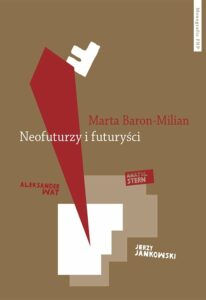
Głównym celem monografii jest wielostronna interpretacja idei ojczyzny w liryce bułgarskiej po 1989 roku przez pryzmat koncepcji pamięci kulturowej i traumy. Zgodnie z przyjętym modelem teksty poetyckie są nośnikami pamięci kulturowej i traumatycznej, a zatem wyznaczają przestrzeń, w której pamięć jest przedmiotem kreacji, afirmacji i wspólnotowego konsensusu. W ramach dialogu lirycznego z tradycją literacką dochodzi do rekonstrukcji, odtworzenia lub rewizji tradycyjnych wyobrażeń o tym, co rodzime. Manifestowany w liryce stosunek do ojczyzny bułgarskiej objaśniany jest w szerokich kontekstach historycznych, społecznych, kulturowych i literackich. Problematyzacja idei ojczyzny odnosi się głównie do wątków traumatycznego charakteru bułgarskiej (post)transformacji i jej ideowej polifonii.
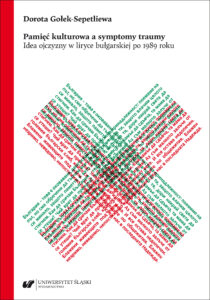
Series: Routledge Studies in World Literatures and the Environment
The ambition of this book is twofold. The theoretical part is a plea for an urgent redefinition of human-animal relations on the basis of nonanthropocentric animal ethic embraced by premodern communities indigenous to North America. The analytical part is a close reading of Linda Hogan’s poetry and prose in search for the coordinates of a decolonized animal ethic which would foster interspecies becoming. The monograph identifies the recurring tropes, motifs, and attitudes that underpin Hogan’s treatment of nonhuman animals and traces the way she depicts the human-animal bond, especially in the face of the ongoing anthropogenic impact. The major questions guiding the analysis of Hogan’s oevre are the following: who are the animals we share our earthly lives with; what can they teach us about ourselves; how can animals guide us toward more sustainable futures; and what are the conditions of possibility of an interspecies, human-animal thriving.
